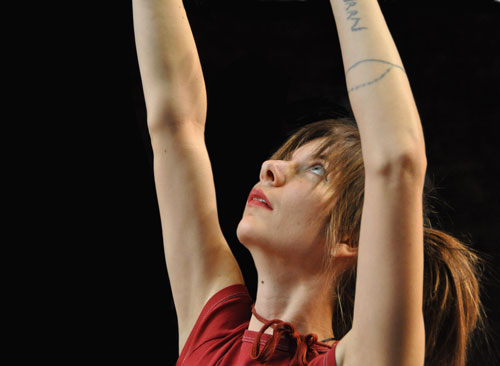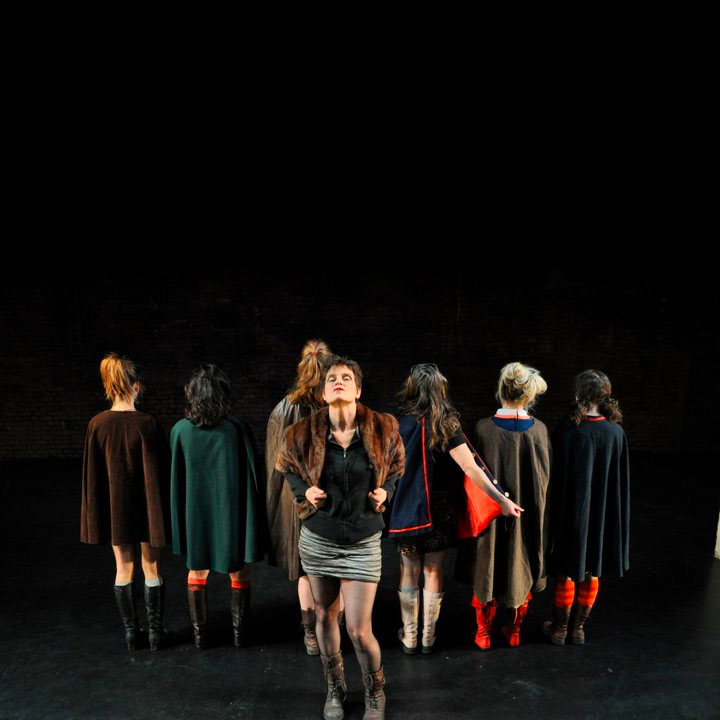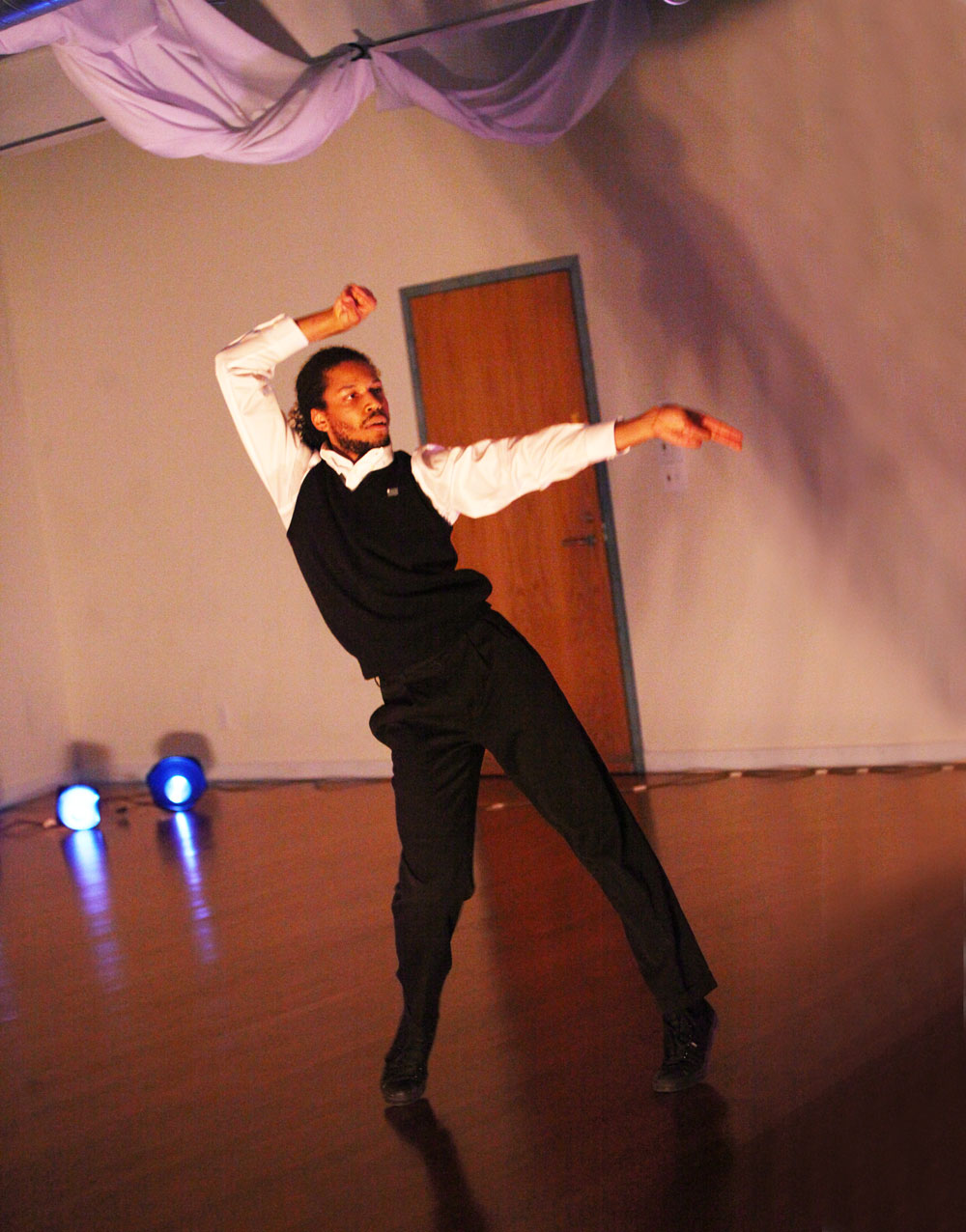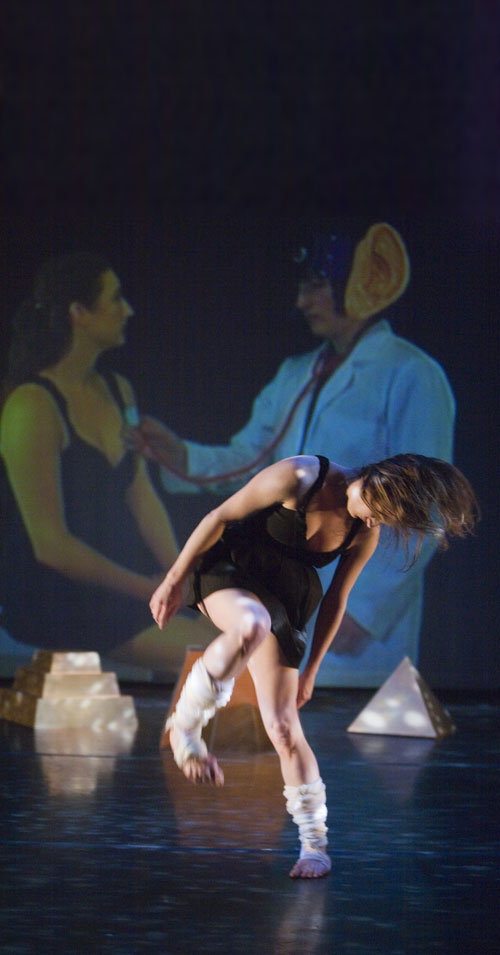Dance Us Beyond the Quotidian
Lightsey Darst reviews the recent performances of SCUBA Touring Dance Network at the Southern Theater, and in the process reflects on the bigger question: what do we go to performance for in the first place?




WHAT DO WE GO TO PERFORMANCE FOR? Why leave our cozy homes to venture out in the dark among strangers, to sit, cold and uncomfortable, silent and still, for an hour or two? Why pay for this dislocation, confinement, mutual isolation?
There is something to see, maybe: shapes leading our mirror neurons a dance. But there is also something to be: there are gestures to clothe and form inchoate desire; looks from which we may, at last, see what we are looking for; movements we may fill to feel our way forward; encounters we can cut in before the last scene of the reoccurring dream. They are fantastic, dreamy, dramatic, unlike what we learn from most people, and that is exactly their value. They lift or plunge us, when we echo or remember them, beyond the quotidian.
A recent case in point: this year’s SCUBA show. SCUBA, a dance touring network formed by theaters in Minneapolis, Seattle, Philadelphia, and San Francisco, brought us this is a forgery by Seattle’s Amelia Reeber, Flight Attendants by Jumatatu Poe of Philadelphia, and Cape Dance by the Twin Cities’ Judith Howard. I can safely say that none of these three is a masterwork. All, in fact, perceptibly swerve from their deeper thrusts.
Amelia Reeber fills the stage with platonic solids and coordinated, complex, yet ultimately safe and doodly movement, the silence with string meanderings and faux-tribal jangle drums (the work of Sam Mickens), and a screen behind her with a witty, silly projection of herself, a larger than life kitten, and a very 1980s cosmos (sparkly with Doctor Who-ish special effects). And yet nothing quite happens in any of these realms; clever as they are, they wind up feeling like distractions from a central lack. Jumatatu Poe amuses everyone with a surreal airline scenario — a flight attendant folded in a rolling suitcase, passengers (audience members seated on stage) treated to single peanuts doled out on paper plates. But the real-life story of an angry flight attendant dogs this work (surely conceived before that incident occurred), showing a raw edge Poe doesn’t reach. Judith Howard‘s Capes largely succeeds in creating its own strange world, but the chunks of ice and a chainsaw on stage suggest some other and raging source Howard barely taps.
And yet one doesn’t come away empty-handed. The sort of critical pronouncements above, though I stand by them, represent the summarizing view of someone charged with adding up the total score of a performance — which is not how we see the work in real life. Rather, things pass before us, around and over us; some linger, some we take home. I’ve been thinking recently about the category of “dances I remember,” and if I’m honest, it’s a strange category: bits and pieces, spotlit seconds, some from work that, overall, didn’t move me, while dances I judged good have gone entirely out of my mind without leaving a trace. The moment does not yield to the sum.
For example: Reeber’s hands spin and curl in fantastic articulations above her head. Horns, headdress, feather fascinator, braid crown, whatever it is, she makes it out of air and specific intention. It’s there when she draws it there, the willful idea preceding the thing into the world.
Or: Reeber, worn out, meets a veiled figure at the edge of the stage. The two stand face to face, almost kissing. What do you look into there, and how do you keep looking? Is she another self, a dead mother, an opposite? Reeber fastens herself to the other by long mummy-cloths wrapped around her own legs, then heads into the upstage dark, slowly unwinding herself with little plucks and flicks of her feet.
Poe warps a flight attendant’s practiced gesture into a stylized sweep, his long fingers tracing the arc of exit, the movement joined by his whippy, loose body until the gesture is full-on vogue, twisting to the floor. Escape! He and Michele Tantoco, such radically different movers (she’s all tight bursts of energy) try to fly through each other. They’re earthbound, effortful, and yet their wrestling produces a beautiful truth of contact. We can go here.
A cape is merely a semicircular cut of cloth draped over the shoulders, barely a garment, but Howard’s capes transform her dancers. Sleuth, pervert, cavalier, they sneak and swagger over the stage. One is the perched equestrienne and her richly caparisoned horse; one is a superhero, and later, a gently hovering angel. The capes conceal and accent, drape and reveal; fantasies that spin themselves, they wear the dancers, not the other way around. What can you become if you abandon yourself to your details like a ghost in a costume shop? Step out of your door and be what the wind makes you.
______________________________________________________
Noted performance details:
SCUBA Touring Network for Dance — featuring work from Amelia Reeber (Seattle), Jumatatu Poe (Philadelphia), and Judith Howard (Twin Cities) — was on stage at the Southern Theater in Minneapolis April 22 & 23.
______________________________________________________
About the author: Originally from Tallahassee, Lightsey Darst is a poet, dance writer, and adjunct instructor at various Twin Cities colleges. Her manuscript Find the Girl was recently published by Coffee House; she has also been awarded a 2007 NEA Fellowship. She hosts the writing salon, “The Works.”
Editor’s note: Congratulations are in order — Lightsey’s debut poetry collection, Find the Girl (Coffeehouse Press, 2010), was recently named the 2011 Minnesota Book Award-winner for poetry. We couldn’t be happier for her well-deserved honor!